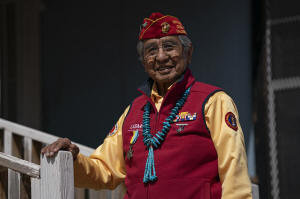Pentagon restores histories of Navajo Code Talkers, other Native
veterans after public outcry
[March 20, 2025]
By TERRY TANG
PHOENIX (AP) — The Pentagon restored some webpages highlighting the
crucial wartime contributions of Navajo Code Talkers and other Native
American veterans on Wednesday, days after tribes condemned the action.
The initial removal was part of a sweep of any military content that
promoted diversity, equity and inclusion, or commonly referred to as
DEI. Following President Donald Trump’s broader executive order ending
the federal government’s DEI programs, the Defense Department deleted
thousands of pages honoring contributions by women and minority groups.
Department officials say the Navajo Code Talker material was erroneously
erased.
“In the rare cases that content is removed — either deliberately or by
mistake — that is out of the clearly outlined scope of the directive, we
instruct the components and they correct the content so it recognizes
our heroes for their dedicated service alongside their fellow Americans,
period,” Pentagon press secretary John Ullyot said in a statement.
Several webpages on the Code Talkers landed on a “404 - Page not found”
message Tuesday. Some were back up Wednesday — although any that also
mention Native American Heritage Month remain down. Thousands of other
pages deleted in the DEI purge are still offline.
White House officials informed the Navajo Nation that an artificial
intelligence-powered automated review process looking for content with
DEI initiatives led to the elimination of anything mentioning “Navajo,"
according to a statement from Navajo Nation President Buu Nygren.

Nygren, who sent a letter to the Defense Department requesting clarity
on the issue, said he's pleased by the resolution.
“I want to assure the Navajo people that we remain in close
communication with federal officials to ensure the legacy of our
cherished Navajo Code Talkers is never erased from American and Navajo
history,” Nygren said.
He also pointed out the 574 federally recognized tribes across the U.S.
are sovereign nations and not defined by DEI classifications, a stance
broadly supported by other Native American leaders who also sent letters
to the Trump administration.
The U.S. Marine Corps initially recruited 29 Navajo men to develop a
code based on the unwritten Navajo language in World War II. Using
Navajo words for red soil, war chief, clan, braided hair, beads, ant and
hummingbird, for example, they came up with a glossary of more than 200
terms, later expanded, and an alphabet. To convey the word “send,” Code
Talkers would say the Navajo words for “sheep, eyes, nose and deer.”
Hundreds of Navajos followed in their footsteps, sending thousands of
messages without error on Japanese troop movements, battlefield tactics
and other communications crucial to the war’s ultimate outcome. The code
stumped Japanese military cryptologists.
The Code Talkers participated in all assaults the Marines led in the
Pacific from 1942 to 1945 and are credited with helping the U.S. win the
war. Hundreds of Native Americans from more than 20 tribes also served
as code talkers during World War I and World War II, according to the
Smithsonian's National Museum of the American Indian. Among them were
Choctaw, Cherokee, Osage, Chippewa and Hopi speakers.

[to top of second column]
|

WWII veteran and Navajo Code Talker Peter MacDonald Sr. is
photographed at his home on the Navajo reservation in Tuba City,
Ariz., April 28, 2020. (AP Photo/Carolyn Kaster, File)

Among those alarmed to hear of the missing Navajo Code Talker
webpages was Peter MacDonald, 96. He and Thomas H. Begay are the
only two Navajo Code Talkers still living today.
“That code became a very valuable weapon and not only saved hundreds
of thousands of soldiers, but it also helped win the war in the
Pacific,” MacDonald said by phone from his home in Tuba City in the
Arizona portion of the Navajo Nation. "And it has absolutely nothing
to do with DEI."
A Republican who voted for Trump, MacDonald said he thinks the
current administration needs to better walk the line between getting
rid of DEI and ignoring history.
“That’s why I’m very concerned that communication from the Pentagon
down to the various military units should be taught or learn that
this information is history, and you don’t want to hide history,”
MacDonald said.
The Defense Department has had to issue reassurances that it is not
omitting historic achievements by servicemen and women of color.
Besides the Code Talkers, the agency also on Wednesday restored a
webpage describing baseball and civil rights icon Jackie Robinson’s
military service after it was missing earlier in the day. Last week,
pages honoring a Black Medal of Honor winner and Japanese American
service members were also restored.
“Everyone at the Defense Department loves Jackie Robinson, as well
as the Navajo Code Talkers, the Tuskegee airmen, the Marines at Iwo
Jima and so many others — we salute them for their strong and in
many cases heroic service to our country, full stop,” Ullyot said.
“We do not view or highlight them through the prism of immutable
characteristics, such as race, ethnicity or sex.”
Michael Smith, whose father, Samuel “Jesse” Smith Sr., was a Navajo
Code Talker, questioned why these pages were removed at all.
“I don’t know how taking Navajo Code Talkers off the Department of
Defense website is saving the United States any money because that’s
not consistent with the president’s order,” said Smith, who helps
organize annual celebrations of the Code Talkers.

Gov. Stephen Roe Lewis of the Gila River Indian Community in Arizona
also expressed disappointment, claiming there was missing content
relating to all Native American veterans, including Ira Hayes. Hayes
was an enrolled member of the tribe and one of six Marines featured
in an iconic 1945 Associated Press photograph of U.S. forces raising
an American flag during the Battle of Iwo Jima.
Even with some being reposted, he remains worried web content
removal is “the tip of the iceberg.”
“The way it looks in the (executive) order, this language is skewed
and made to sound like the diversity programs are the ones that are
unethical," Smith said.
All contents © copyright 2025 Associated Press. All rights reserved |